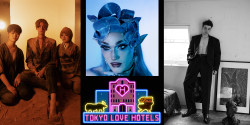
Originally published on metropolis.co.jp on April 2013

Joel Schumacher spent a week in Naha last month as head of the jury at the Okinawa Movie Festival. The lanky and charming Hollywood director—whose films include The Lost Boys and Batman Forever—was full of praise for the fest, now in its fifth year.
“I thought [the opening ceremony] was so exciting, the whole energy of that crowd,” he enthused. As opposed to other festivals rife with ego, or so international they lose their grounding, he described this one as a “community outreach.” This was definitely the vibe Metropolis got from the crowds at the festival’s events—all free of charge. “They’re really trying to make the Okinawans feel part of this festival,” said Schumacher. “I wish more festivals did that.”
What’s his opinion of Japanese film? Many of his peers “are very, very inspired by Kurosawa,” he said, mentioning Tarantino. But he had less to say about today’s output. “We don’t get enough Japanese film in the United States… [just] the ones that are most publicized or have won awards.”
Schumacher said his role on the jury stemmed from his successes in Japan through Warner Brothers, leading to an invitation from Warner Japan chief Bill Ireton. What was to be his criteria for picking the best films?
“Whatever it is, the wackiest comedy, the biggest epic, if it feels like there was a conductor who picked up the baton… [if] you feel there was a vision here.” But it’s hard to pick winners. “Anyone who finishes a movie should win an award.” So he advised his jury, “Let’s be positive… Nobody sets out to make a bad movie.”
The 73-year-old’s success in Asia looks set to continue; he hinted about a juicy, big-budget, wartime movie he’ll be shooting in Shanghai. Did Hollywood’s stagnation mean producers had to work with an international audience in mind? “They have been for a long time,” he said, referring to his adaptation of The Phantom of the Opera, which grossed more in Asia than in any other region.
A chat of more than an hour moved on from the festival to Tinsel Town’s “identity crisis.” “The business ate itself up,” Schumacher explained. “It outpriced itself.” Advertising and talent fees skyrocketed. Studios had to invest a fortune for a tiny profit margin. “They started saying ‘no.’ And that has changed the business,” he said. Thus was born the era of trilogies and remakes. “Hollywood has corrupted the world,” he chuckled.
Born in New York City, Schumacher designed costumes for Woody Allen (Sleeper, etc.) and directed two TV movies before his first feature. But things have gone full circle back to the small screen. He recently directed part of the edgy Netflix series House of Cards. “Cable has changed television,” he said, citing ratings of HBO and AMC shows.
Schumacher mused about making a film in Japan. “It would be very contemporary.” “Like Lost In Translation?” someone piped up. “That is not how I see Japan at all,” he said firmly. “I love the Blade Runner part of Tokyo… Tokyo always feels like right now.”







